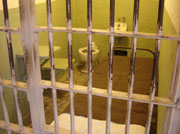
The use of torture and ill treatment of detainees held by Afghan security forces is widespread according to a new report from the United Nations Assistance Mission in Afghanistan (UNAMA). Through interviews with detainees, the report, Treatment of Conflict-Related Detainees in Afghan Custody, found that 326 out of 635 detainees held for various national security crimes or crimes related to the armed conflict had experienced torture and ill-treatment at numerous facilities run by the Afghan National Police, National Directorate of Security, Afghan National Army, and Afghan Local Police. The levels of torture and ill-treatment cited in this report have been denied by the government of Afghanistan.
Key Conclusions
- The findings of this report underscore the need for reforms within the security and justice sectors in order to create a stable future for Afghanistan, especially as international forces are being withdrawn.
- The report contains 64 recommendations that are crucial for a stable security sector, though such reform requires the support of the Afghan government and the international community. UNAMA also made recommendations in 2011, and some have yet to be implemented.
Analysis
The report says that the incidence of torture increased compared to the previous years’ report at the Afghan National Police and the Afghan National Border Police facilities, while the levels of torture of those in custody of the National Directorate of Security (NDS) was slightly lower than last year. This slight decrease may not be completely relevant in light of the documented statement by an NDS officer who said that the NDS has secret facilities where the tortured detainees were transferred to avoid any interrogation by visiting delegations. In terms of children, UNAMA documents that 80 children were subject to torture and ill-treatment out of the 105 interviewed, a 14 percent increase from last year.
UNAMA records that 330 out of 552 conflict-related detainees (60 percent) were detained on allegations of being Taliban supporters.
The report further details the lack of due process standards within the criminal justice system. While the constitution and the interim criminal procedure code contain guarantees and safeguards against torture, many of these provisions have been ignored, according to the report. Courts regularly accepted confessions as evidence without a challenge. Many of the judges and prosecutors interviewed expressed that most often the defendants were held for periods beyond the legal pre-trial time limits, and the sensitive relationship between the judicial personnel and NDS raised concerns about personal security and fear of retaliation from the NDS. The judges also noted in particular the lack of a working definition of “torture” within Afghanistan’s penal laws, which has further made it difficult to recognize it as a punishable act against those implicated.
The report also records the various institutional reform measures undertaken by the government of Afghanistan to address the issue of torture and ill-treatment, including the creation of a subdirectorate of human rights in 2012 by the NDS, with a mandate to investigate and report the allegations of torture and ill-treatment to the NDS director. However, the body had not reported any case of proven torture or ill-treatment. The NDS also claimed that the internal investigations by an independent delegation comprising parliamentarians was completed, however UNAMA notes that the findings were not made public. The International Security Assistance Force (ISAF) has said it reviewed the detention facilities maintained by the Afghanistan Forces before granting them certificates that allowed detainee transfers in accordance with its six-phase detention facility monitoring program.
Missing from the report is mention of ethnic profiling during the treatment of conflict-related detainees. The decades of war in Afghanistan has witnessed the cross-targeting of many ethnic groups within the country, contributing to entrenched ethnic divides within the society. Such practices by the national forces would create further instability in the country rather than provide a way for this ethnically divided society to begin to reconcile.
The lack of any accountability of the officials in Afghanistan for torture and ill-treatment, as well as the absence of a reliable justice system, challenges the legitimacy of its institutions. This is of particular concern as the international forces are withdrawing, and there is a need for the domestic institutions to take responsibility of the security and justice measures within the country. A lack of faith by the people of Afghanistan in their national forces and the judicial organs would mean a loss of credibility for these institutions.
UNAMA made recommendations for reforms in 2011, some of which have still not been implemented. In this report, UNAMA offers 64 more recommendations, including several measures to increase accountability within the security forces, as well as policy and administrative reforms for the Ministry of Interior and the government. Recommendations are also enlisted for the Supreme Court and the Parliament for broader justice and legislative reforms.
Implementing these recommendations (in addition to the ones made in 2011) is absolutely crucial for a stable security sector within Afghanistan. In addition to other measures, UNAMA is recommending the creation of an independent national preventive mechanism to inspect all detention facilities, conduct follow up investigations, and make detailed technical recommendations on prosecution of perpetrators and remedial measures. Though this requires support from the Afghan government and the international community, and it remains to be seen if the political will is there.
Suparva Narasimhaiah is an intern with the Coping with Crisis program at the International Peace Institute.
Photo credit: IRIN




